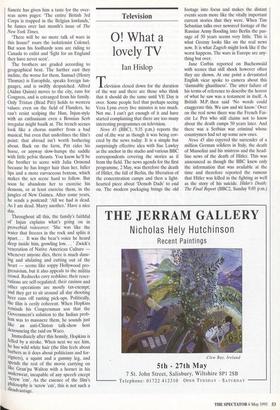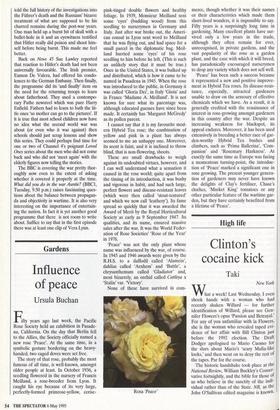Television
0! What a lovely TV
Ian Hislop
Television closed down for the duration of the war and there are those who think that it should do the same until VE Day is over. Some people feel that perhaps seeing Vera Lynn every five minutes is too much. Not me. I can't get enough of it and have started complaining that there are too many interesting programmes on television.
News 45 (BBC1, 9.35 p.m.) reports the end of.the war as though it was being cov- ered by the news today. It is a simple but ,surprisingly effective idea with Sue Lawley as the anchor in the studio and various BBC correspondents covering the stories as if from the field. The news agenda for the first programme, 2 May, was therefore the death of Hitler, the fall of Berlin, the liberation of the concentration camps and then a light- hearted piece about 'Demob Dads' to end on. The modern packaging brings the old footage into focus and makes the distant events seem more like the vitally important current stories that they were. When Tim Sebastian talks over newsreel footage of the Russian Army flooding into Berlin the pas- sage of 50 years seems very little. This is what Grozny looks like on the real news now. It is what Zagreb might look like if the worst happens. The wars in Europe are any- thing but over.
Jane Corbin reported on Buchenwald with scenes that still shock however often they are shown. At one point a devastated English vicar spoke to camera about this `damnable ghastliness'. The utter failure of his terms of reference to describe the horror of what he saw was a testament in itself. A British M.P. then said 'No words could exaggerate this. We saw and vie know.' Over on the real news there was the French Fas- cist Le Pen who still claims not to know about the death camps 50 years later. And there was a Serbian war criminal whose countrymen had set up some new ones.
News 45 also cqyered the surrender of a million German soldiers in Italy, the death of Mussolini and his mistress and the head- line news of the death of Hitler. This was announced as though the BBC knew only the information that was available at the time and therefore reported the rumour that Hitler was killed in the fighting as well as the story of his suicide. Hitler's Death: The Final Report (BBC2, Sunday 9.05 p.m.) told the full history of the investigations into the Fithrer's death and the Russians' bizarre treatment of what are supposed to be his charred remains during the post-war years. One man held up a burnt bit of skull with a bullet-hole in it and an eyewitness testified that Hitler really did poison and shoot him- self before being burnt. This made me feel better.
Back on News 45 Sue Lawley reported that reaction to Hitler's death had not been universally favourable. The Irish premier, Eamon De Valera, had offered his condo- lences to the German Embassy. Then finally, the programme did its 'and finally' item on the need for the returning troops to learn about fatherhood. They used a contempo- rary Pathe newsreel which was pure Harry Enfield. Fathers had to learn to bath the lit- tle ones 'so mother can go to the pictures'. If it is true that most school children now have no idea what the second world war was about (or even who it was against) then schools should just scrap lessons and show this series. They could perhaps find time for one or two of Channel 4's poignant Loved Ones series about the men who did not come back and who did not 'meet again' with the elderly figures now telling the stories.
The BBC is covering the war pretty thor- oughly now even to the extent of asking whether it covered it properly at the time. What did you do in the war Auntie? (BBC1, Tuesday, 9.50 p.m.) raises fascinating ques- tions about the balance between propagan- da and objectivity in wartime. It is also very interesting on the importance of entertain- ing the nation. In fact it is yet another good programme that there is not room to write about. Suffice to say that in the first episode there was at least one clip of Vera Lynn.



































































 Previous page
Previous page